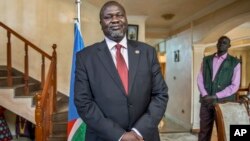South Sudan's government and rebels have accused each other of breaking the cease-fire that was supposed to go into effect on Saturday.
Fighting in South Sudan continues despite the cease-fire deal stating that all fighting should have stopped Saturday night.
At a news conference in Addis Ababa on Monday, former vice president turned rebel leader Riek Machar accused government troops of not honoring the peace deal.
“Up to this morning they have been fighting in Unity [State]. They have troops that they don’t control, who are burning villages, killing civil population and all that,” said Machar.
Peace deal in jeopardy
But South Sudan army spokesman Colonel Philip Aguer said forces loyal to Machar have attacked forces loyal to President Salva Kiir, with the intention of gaining more territory.
Kiir signed the peace deal last Wednesday, while voicing strong reservations about it. The deal calls for demilitarizing the capital city of Juba, forming a transitional government of unity within 90 days and giving rebels the position of vice president.
Machar said there is a danger the continued fighting will wreck the peace agreement.
“We question the political will of the government, if the government is serious to implement the peace agreement," he said. "Is the government united behind the peace agreement or do they have divisions?”
Several previous agreements between the government and rebels have broken down almost as soon as they were signed.
The 20-month-long conflict in South Sudan began after the president accused Machar, his former deputy, of plotting a coup. Fighting escalated quickly and ethnic tensions flared as well. More than 2 million civilians have been displaced, with most of them in need of humanitarian aid.
The United Nations has threatened to impose travel and financial sanctions against those suspected of obstructing the peace process.




